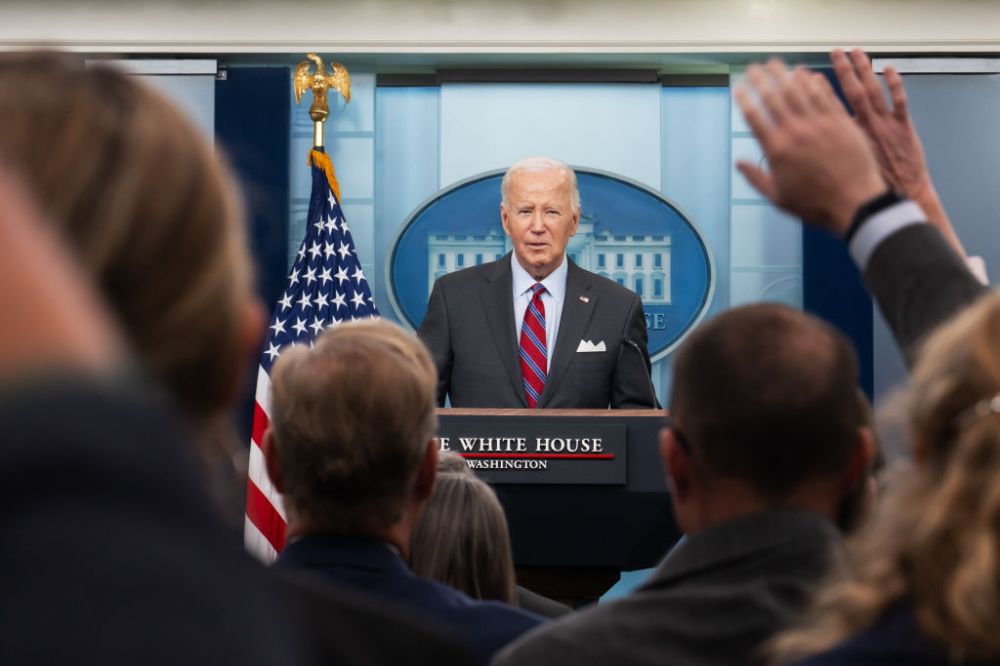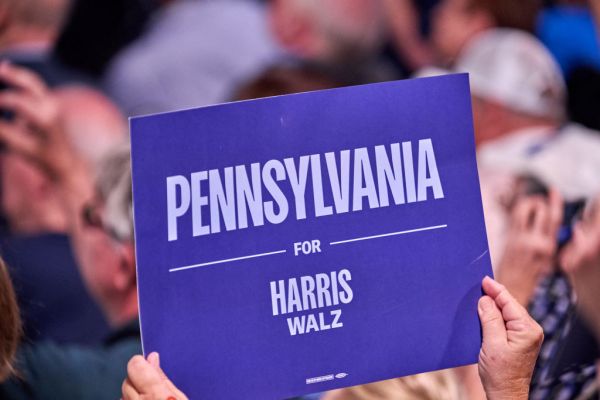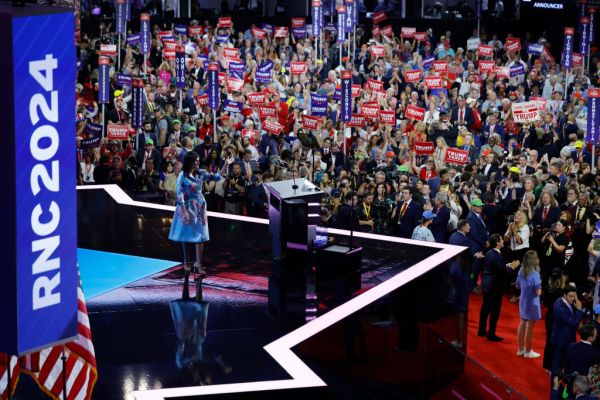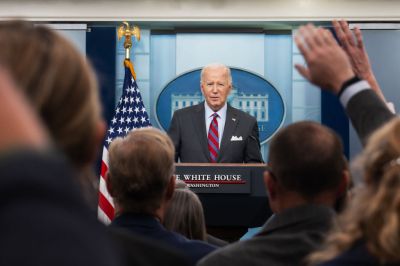Everyone has their biases. One of mine is assuming that most politicians aren’t stupid. (I said “most.”)
If a candidate for office answers a question in a way I wasn’t expecting, a moment’s thought usually reveals some intelligent, strategic reason for doing so. Here’s a nice example from Kamala Harris as she takes a tentative step out of her basement:
“Iran” is plainly not the correct response on a planet where China and Russia exist, but it’s an interesting response with a clear strategic purpose. After 12 years of Barack Obama and Joe Biden trying and failing to broker detente with Tehran, Harris means to show that her presidency will be different.
Whoever convinces a majority of Americans that they are the true “change candidate” in the race will probably win next month’s election. She’s hinting that her Iran policy will break with Biden’s, which might be enough to tip center-right supporters of Israel into her column, however reluctantly.
Harris isn’t stupid. And even if she were, certain questions are so predictable that a strategically intelligent answer can be scripted and memorized in advance.
So imagine my confusion upon watching this clip from The View on Tuesday and finding myself unable to explain it as not-stupid:
More alarming than the answer itself was Harris pausing and seeming to devote real thought to the matter, as if she’d never considered it before. She’s vice president to a man whose job approval has been below 42 percent nearly every day of the past year. If there’s any topic on which she should have had a whiz-bang response ready to go, it’s “You’re going to be Joe Biden 2.0, aren’t you?”
As her answer unfurled, the most she could do to separate herself from the president was to say that she’d put a Republican in her Cabinet.
But fine. We’re all human, we all whiff on easy pitches sometimes. Fortunately for Harris, she had another nationally televised interview lined up a few hours later—and even more fortunately, she was asked the “What would you do differently?” question again.
She got a do-over. And she whiffed. Again.
By Tuesday evening, the Trump campaign’s “war room” X account was circulating the video of her from The View with a simple two-word caption: “NEW AD.” “Expect to see this clip every single time you turn on the television between now and Nov. 5,” one Trump aide crowed to Axios.
What was Harris thinking? What would compel her to bear-hug a figure like Biden, who was on track not just to lose but to lose to a convicted felon—handily?
Is there any intelligent, strategic explanation for this?
No good answer.
When I put that question to the Dispatch Slack channel this morning, one colleague invited me to consider the alternative. What would Harris have gained by getting specific about Biden’s mistakes?
Let’s say she had flagged border security as a point of disagreement between them. That would have opened a can of worms: Which border policies in particular would she have changed? Did she advise the president against them at the time? Why didn’t he listen to her?
Even if she had lined up some crafty dodges for those questions (“I can’t comment on my private conversations with Joe”), the fact that she had identified an area of conflict between them would be catnip for future interviewers to explore with her. “You said previously that you oppose Biden’s border policy with respect to A, B, and C. But why don’t you also oppose it with respect to X, Y, and Z?”
She would spend the last weeks of the campaign being quizzed repeatedly about it. Maybe that would redound to her advantage by reassuring voters that she agrees with them about the president’s failure. (“Change candidate”!) But maybe not: It might end up reminding them instead of how utterly the Biden-Harris government neglected to carry out one of its essential duties. Donald Trump would love to have immigration dominate the race in October, I suspect, even if Harris is pretending to be on his side about it.
And no matter how carefully worded her answers might be, she’d probably end up sounding too dovish on the border to make right-leaning voters happy and too hawkish to please progressives who already regard her with suspicion.
All in all, my colleague makes a fair point. There’s no genuinely good answer for the vice president in an unpopular administration to give when asked about its mistakes.
But … there has to be a better one than simply rubber-stamping that administration’s decisions in their entirety, no? “As president, I would have done exactly what the guy who was headed for a landslide defeat did” simply cannot be the optimal response here.
How about something like this? “I think the president’s executive actions this summer to tighten the border were wise, and have gotten results. He waited to act as long as he did because he hoped the parties might get together on a border bill in Congress. I’m not as patient, or as confident in the Senate’s ability to compromise, as he is.”
Not a great answer, admittedly, but better than the absurdity of claiming that she can’t think of anything in Biden’s record to second-guess.
The most one can say in defense of Harris’ rubber-stamp approach to the “what would you do differently?” question, I think, is that it’s in line with the meta-strategy of her campaign. From the start, she’s strained to repackage herself as an utterly generic Democrat with few clearly defined policy positions. Instead of offering voters a robust agenda, she’s offered them a “blank slate” onto which they can project their own preferences.
And it’s worked. Kamala Harris is a lot more popular now than she was when she was best known for standing behind Joe Biden during his public statements.
The “what would you do differently?” dilemma is agonizing for her because it deprives her of her “blank slate” appeal. She can answer it by rubber-stamping Joe Biden’s entire agenda or she can answer it by distinguishing her own agenda, but one way or another she’s forced to fill in the policy blanks.
She may have decided that the rubber-stamp answer is the least bad approach because it spares her from having to get into details. “Joe did everything right” is closer to a “blank slate” answer than “Joe did X, Y, and Z wrong” for the simple reason that many voters, God love ‘em, have no idea what Joe did and didn’t do as president—especially the voters that Harris is chasing right now. She’s not doing podcasts like Call Her Daddy lately because she’s keen to talk about sex, she’s doing them because she’s trying to reach an audience that might not follow politics closely and has only now begun paying attention to the election.
For a group like that, specifying “we need to be tougher on immigration” might alarm some, whereas saying “I would have done what Joe did” may sound fine if they happen not to know the particulars of what Joe did. The “blank slate” in this case is the dim political awareness of the low-information voter.
Underlying all of this, I think, is a Democratic theory of the election in which Harris is the “change candidate” by default unless she screws it up by getting into the weeds on policy. The logic can be expressed as a mathematical formula: Biden - age + Trump being Trump = victory. Being lucid is enough to meaningfully distinguish her from the president; not having been president before is enough to distinguish her meaningfully from Trump. Her response to Stephen Colbert was revealing in that regard: I’m not Joe Biden and I’m not Donald Trump, she reminded viewers. What more do you need to know?
She’s the only “change” on the menu, supposedly. All she has to do to win is ride that vibe and keep voters from thinking too hard about policy.
So when she’s asked “what would you do differently from Biden?”, the least bad answer for her is the one that changes the subject the fastest: “I’d do what he did. Next question.” The truthful answer, “I won’t be 81 years old and demented,” isn’t an option.
That’s the best I can do to explain all of this in strategic terms. But there’s also a nonstrategic possibility.
Hostage crisis?
What if Harris is reluctant to criticize the president because she worries how he—or his inner circle, more likely—will react?
She’s never had the best relationship with Bidenworld. Even before Harris joined the ticket in 2020, Jill Biden allegedly had choice words for how she had questioned Joe’s commitment to racial equality at the first Democratic presidential debate in 2019. Within six months of Biden taking office, leaks began to appear in the press about “low morale, porous lines of communication and diminished trust” in the new vice president’s office.
Before that first year was out, sources were whispering to the media that “West Wing aides have largely thrown up their hands at Vice President Kamala Harris and her staff.” Harris’ own staff complained that she had been “sidelined.”
The two camps coexisted for the next three years, however uneasily, but who knows whether the humiliating way in which the president left the race this summer might have reopened old wounds? As pressure began building on Biden to quit after his disastrous debate with Trump, he was reportedly heard to tell confidants, “Kamala can’t win.” Even after he bowed to reality and withdrew, he apparently continued to nurse a grudge over how Democrats shoved him aside. This report from NBC News was published just 10 days ago:
President Joe Biden has privately complained to allies that his name and his accomplishments have virtually disappeared from the national conversation and about how quickly the party that he has served for more than five decades appears to have moved on from him, according to six people familiar with his comments.
Biden has noted at times that Vice President Kamala Harris, who took his place at the top of the Democratic ticket in July, hasn’t been mentioning him in her campaign speeches lately, including when she talks about an economy he believes his policies set on a positive trajectory, these people said.
On Sunday, CNN noticed how Biden has begun injecting himself into the race, sometimes with messages that conflict with the Harris campaign’s. The Harris campaign has noticed as well. Last month, for instance, her team supposedly had to negotiate with the White House to scale back a Biden “victory lap” speech after the Federal Reserve slashed interest rates. The president wanted to take credit for the economic recovery, while “Harris wants to talk about the pain that people are feeling and how much more there is to be done.”
That’s not all. As John Podhoretz pointed out, Biden praised Florida Gov. Ron DeSantis this week for his hurricane response at a moment when DeSantis was engaged in a war of words with Harris on the subject. The president also spoke at the White House on Tuesday about the threat from Hurricane Milton at the same hour that Harris was appearing on The View. And last week, with his vice president eager to assert herself as the voice of the Democratic Party, Biden dropped by the White House briefing room to field questions from the press for the first time in his presidency.
“Within Ms. Harris’s campaign, reactions to the president’s impromptu appearance ranged from calling it unhelpful to genuine anger and incredulity,” the New York Times reported on Wednesday.
Both CNN and NBC News claim that Biden has assured Harris’ team “that he supports her doing whatever she needs to do to win”—i.e., criticizing him if doing so will improve her chances of victory—but some members of the president’s inner circle continue to resent that she’s on the ballot instead of him. Quote: “Even into recent days, people who have spoken with close Biden advisers told CNN they have heard complaints that the president would be in the same spot or better right now had he stayed in the race.”
It takes a lot of bitterness to drive otherwise sober political operatives to a conclusion as insane as that.
Is it surprising that Kamala Harris, aware of that bitterness, might fear that taking Biden up on his offer to criticize him would generate reprisals from his inner circle? One would hope that Ron Klain, Mike Donilon, Steve Ricchetti, Bruce Reed, Anita Dunn, and, of course, the Biden family itself, would put egos aside and give Harris carte blanche to maneuver politically for the greater good of defeating Trump. But they’ve been with the old man for ages, they understandably dislike how his career ended, and they probably resent the euphoria on the left that greeted the ascent of a politician as lackluster as his 2020 running mate.
They’ve also seen her work as vice president up close. If she dared to fault Biden for poor border enforcement, say, how confident are we that none of them would angrily dial up CNN or NBC News to “set the record straight” about how useless she was behind the scenes in addressing that problem? How confident is Kamala Harris?
Maybe that’s overblown. I prefer to believe that Bidenworld shares my panic about a second Trump term and wouldn’t hold the Democratic nominee hostage politically to prevent her from attacking an unpopular president if she stands to gain by doing so. If Harris is reluctant to criticize Biden, the reason is probably more prosaic: Many Democrats support the president’s policies, feel some personal affection for him, and might recoil at seeing his top deputy undermine his legacy.
But I can’t fault her for taking care not to bruise his considerable ego more than it’s already been bruised. His surprise appearance in the White House briefing room last week came hours after Axios published a splashy piece titled, “The disappearing Bidens: A quiet end to a presidency,” a coincidence Axios itself seemed to regard as more than coincidental. The president and his handlers cared enough about his image that day to prioritize it over Harris’ need for message discipline in the final weeks of a presidential campaign. If I were her, I wouldn’t want to test how high that priority is relative to winning.
In fact, perhaps Bidenworld is done caring about the outcome. Whatever happens next month, he’ll get no credit and plenty of blame. If Harris wins, she’s a genius for having somehow rid herself of Biden’s considerable political baggage. If she loses, there was simply too much of his baggage weighing her down. That won’t be entirely fair to him, but the president’s cronies would tell us that politics has already been grossly unfair to him this year. A little unfairness toward Kamala Harris is karma.








Please note that we at The Dispatch hold ourselves, our work, and our commenters to a higher standard than other places on the internet. We welcome comments that foster genuine debate or discussion—including comments critical of us or our work—but responses that include ad hominem attacks on fellow Dispatch members or are intended to stoke fear and anger may be moderated.
With your membership, you only have the ability to comment on The Morning Dispatch articles. Consider upgrading to join the conversation everywhere.